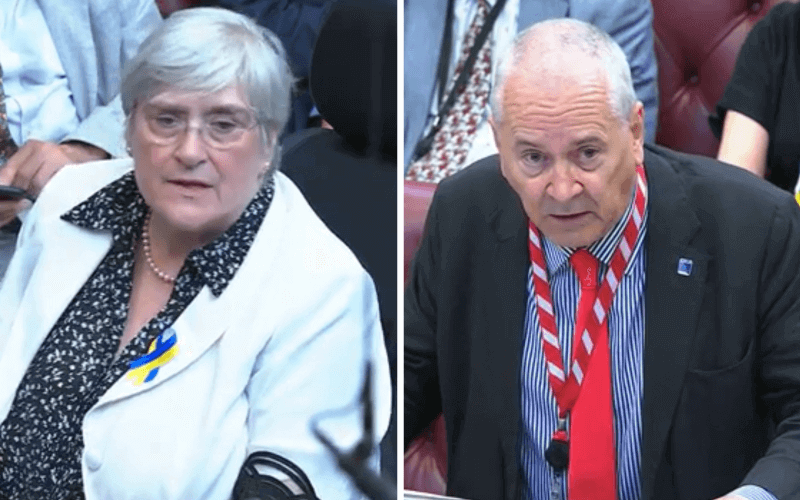A transport minister has told peers that it would be “counter-productive” – and take too long – to draw up rules that would ensure all pilot schemes of self-driving taxis are accessible to disabled people.
Labour’s rail minister Lord [Peter] Hendy was responding to concerns from disabled peer Baroness [Sal] Brinton, who had asked whether the government would make sure disabled people could use the self-driving vehicles when the pilots begin in England next spring.
The former president of the Liberal Democrats told Disability News Service (DNS) earlier this month that she was “very, very concerned” that the government was planning to allow companies to launch self-driving taxis and minibuses even if their vehicles were not accessible to disabled people.
She told fellow peers that the launch of driverless vehicles was a “once in an era moment”, and that contracts with providers should ensure that ramps and audio and visual announcements are “designed in right from the start”.
She said: “The government need to ensure that taxis and bus-like taxis will have accessibility designed into them.
“Otherwise, it will be like everything else for disabled people: reasonable adjustments after the event that are expensive for the manufacturer and never perfect for the user.”
Lord Hendy told her the government would be subject to equality laws in deciding how granting a permit could “improve understanding of how these services should best be designed for and provided to disabled and older passengers”.
And he said permits could enforce certain conditions, while “accessibility considerations” would be set out in guidance.
But he said: “It would be counterproductive to specify detailed requirements in regulation for innovative new services.”
He said it was likely that the first driverless vehicles would be “the same sort of vehicles” already used for taxis and private hire vehicles.
He added: “In the medium term, clearly there will be new designs, and there are already some that are suitable for wheelchairs and people with disabilities.
“We have to acknowledge that automated vehicles are part of an exciting future, but they have to be implemented safely, and she is right that they have to be implemented to benefit all parts of the community.”
He said he had “great sympathy” with Baroness Brinton “striving to make sure that disability is treated in the mainstream, but if we are going to do this quickly, we have to recognise that the early adoption under this act is likely to be using the same sorts of vehicles as are used now”.
He said: “What we are looking for in the medium-term future is new designs, which should have the facilities such as audio-visual equipment and facilities for people in wheelchairs that she would expect.”
Lord Hendy said the government needed to “design in – as far as we can – facilities for disabled people among this”, but the government “have to get going with this, because it is such an exciting future”.
But another disabled peer, the Conservative Lord [Kevin] Shinkwin, pointed out that deputy prime minister Angela Rayner had spoken of the importance of getting disabled people into work, and he questioned how “the retro, ad hoc inclusion of disabled people facilitates the realisation of that worthy goal”.
Baroness Brinton told DNS afterwards that Lord Hendy’s response was “very disappointing” and that she would now seek a private meeting with him to discuss her concerns.
Transport for All (TfA), the disabled-led accessible transport charity, said the government’s plans, which could exclude disabled people from the pilot schemes, were “unacceptable”.
Megan Barnett, TfA’s policy and public affairs officer, said: “Equal access to transport allows us to be part of society.
“If self-driving vehicles are allowed to develop without disabled people, they will only deepen existing inequalities.
“We need a strong national policy to ensure that the design and rollout of this exciting new technology includes disabled people from the start, so our whole community can benefit from driverless vehicles, now and in the future.”
The Department for Transport announced earlier this month that firms would be able to pilot small-scale “taxi- and bus-like” services without being monitored or controlled by a human for the first time next spring, before a potential wider rollout when the Conservative government’s Automated Vehicles Act is implemented in the second half of 2027.
The government believes self-driving vehicles could help reduce deaths and injuries on the roads, add new public transport options in rural areas, and have the potential to improve mobility, accessibility and independence for those who cannot drive, including many disabled and older people.
Picture: Baroness Brinton and Lord Hendy
A note from the editor:
Please consider making a voluntary financial contribution to support the work of DNS and allow it to continue producing independent, carefully-researched news stories that focus on the lives and rights of disabled people and their user-led organisations.
Please do not contribute if you cannot afford to do so, and please note that DNS is not a charity. It is run and owned by disabled journalist John Pring and has been from its launch in April 2009.
Thank you for anything you can do to support the work of DNS…

 Government’s ‘weak’ response to damning transport access report puts right to travel in ‘grave danger’
Government’s ‘weak’ response to damning transport access report puts right to travel in ‘grave danger’ Self-driving taxis that are not accessible will be allowed pilot scheme licenses, government suggests
Self-driving taxis that are not accessible will be allowed pilot scheme licenses, government suggests